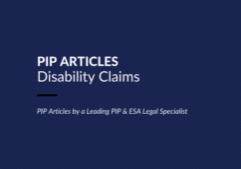Do I still get PIP in a care home?
The mobility component of personal independence payment is not affected by going into a care home, regardless of how long you stay. After the first 28 days in a care home, your award of the daily living component is likely to be affected, but it depends, so read to the end of this article.
Qualifying services
One key thing to find out and be clear about is what legal provisions have been used to fund the costs of any qualifying services. For our purposes, a ‘care home’ is somewhere that provides accommodation, as well as nursing or personal care. For PIP, the ‘qualifying services’ are those that cover the accommodation itself, your board and your personal care.
It is worth noting that these qualifying services only affect your PIP if they are provided under certain Acts of Parliament, so be sure to find out what provisions have been used in your case. Even then, there are exceptions, so keep reading.
Which provisions count?
If one of the following Acts are used in your case, your PIP daily living component will normally be affected:
- Part III of the National Assistance Act 1948
- the Mental Health Act 1983
- Sections 59 and 59A of the Social Work (Scotland) Act 1968
- Part 4 of the Social Services and Well-being (Wales) Act 2014
- Mental Health (Care and Treatment) (Scotland) Act 2003
- the Community Care and Health (Scotland) Act 2002
- section 57 of the Health and Social Care Act 2001
- Part 1 of the Care Act 2014
- for our purposes with PIP, any other Acts that relate to people with disabilities or young people, education or training.
That looks pretty comprehensive, and in the majority of cases, the council will use one of these to pay for the services that the care home provides but they can also use housing legislation or the Local Government Act 1972 to cover the cost, and if they do, then your PIP is unaffected. Also, it was held in a 1997 case that an appeal tribunal has the power to decide that someone’s placement is being paid for using a different legal provision than the one stated by the local authority. A huge amount of money can be involved, so that if your circumstances are at all unusual, get specialist help to make sure that the council has not used the wrong legislation.
What are the exceptions?
For our purposes, the daily living component of PIP remains in payment to a student, where the accommodation is wholly or partly paid for using a student grant or loan, or if they are using a grant from educational institutions. Your PIP is not affected if you are terminally ill and are in a hospice, unless that hospice is a hospital within the NHS. You will need to have told the DWP about entering a hospice, preferably in writing. Neither is your PIP daily living component affected if you are 16 or 17, and you are receiving services from the local authority in a private home, rather than in a care setting. This could be with a relative, a family or another suitable person. The other major exception is for those who are ‘self-funding’.
What counts as self-funding?
Your PIP will not be affected if you are paying for all of your ‘qualifying services’ yourself, even if this is with help from someone else or a charity. It does not matter who owns the care home, or whether DWP benefits or credits such as universal credit or pension credit are being put towards the cost. What counts is who is paying for the qualifying services, so that you can still be self-funding if the local council arranged your placement and the contract; what counts is that you are paying for those ‘qualifying services’.
What if I cannot pay until my house is sold?
If you are likely to become self-funding when your property has sold, then payment of your PIP daily living component should be suspended. When the sale goes through and you repay the council what it has paid so far, inform the DWP and they should both reinstate your ongoing PIP payments, and pay to you the arrears that have built up since the suspension. If the Department closed your claim, rather than suspending it, you should not accept this. Instead, ask them to revise the decision to close the claim, on the grounds that their decision involved an ‘official error’.


 PIP tips & tricks
PIP tips & tricks